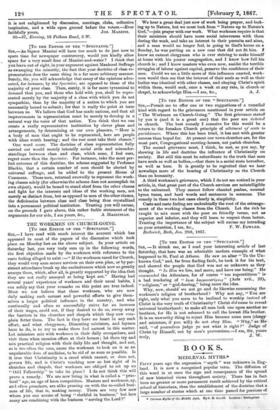THE WORKMEN ON CHURCH-GOING.
[To THE EDITOR OF THE " SPECTATOR."] SIR,—I have read with much interest the account which has appeared in most of the papers of the discussion which took place on Monday last on the above subject. In your article on Saturday last, you very truly stun up in the following words, the first objection made by the workmen with reference to the caste feeling alleged to exist :—" If the workmen cared for Church, they would very soon secure services on their own plan, or by per- sistent attendance break up the exclusiveness which now so greatly annoys them, which, after all, is greatly supported by the idea that they are not really annoyed at being kept out." Having had several years' experience of workmen and their usual habits, I can safely say that your remarks on this point are tree indeed. Must we not believe that these workmen, who are now daily making such earnest and powerful efforts to give them- selves a larger political influence in the country, and who continually and often so successfully strive for an increase of their wages, could not, if they desired to do so, sweep away the barriers in the churches and chapels which they now com- plain fetter them. The fact is they have no heart in any such effort, and what clergymen, Dissenting ministers, and laymen have to do, is to try to make them feel earnest in this matter. Let ministers mix with workmen in their daily occupations, and visit them when occasion offers at their homes ; let them try and mix practical religion with their daily life and thought, and not, as is too often the case, cause the workman to look on it as an unpalatable dose of medicine, to be rid of as soon as possible. Is it true that Christianity is a creed which cannot, or does not, govern life, and is Christ's teaching now ao lost sight of in churches and chapels, that workmen are obliged to set up an " Odd Fellowship " to take its place ? I do not think this will prove a remedy. We are now living in what is called a " prac- tical" age, an age of keen competition. Masters and workmen, ay, and often preachers, are alike pressing on with the so-called busi- ness of life, that is, making money. There are very few now whom you can accuse of being " slothful in business," but how many are combining with the business "serving the Lord ?" We hear a great deal just now of work being prayer, and look- ing up to Nature, but we must look from " Nature up to Nature's God,"—join prayer with our work. What workmen require is that their ministers should have more social intercourse with them during the week, and take an interest in their pursuits and aims, and a man would no longer feel, in going to God's house on a Sunday, he was putting on a new coat that did not fit him. know an earnest clergyman who is ever striving to make himself at home with his poorer congregation, and I know how full his church is ; and I know masters who even now, amidst the terrible struggles of labour against capital, preserve the confidence of their men. Could we see a little more of this influence exerted, work- men would then see that the interest of their souls as well as their bodies was identical with other classes, and obeying Christ's spirit within them, would seek, once a week at any rate, in church or- chapel, to acknowledge Him.—I am, &c., A. J.


































 Previous page
Previous page